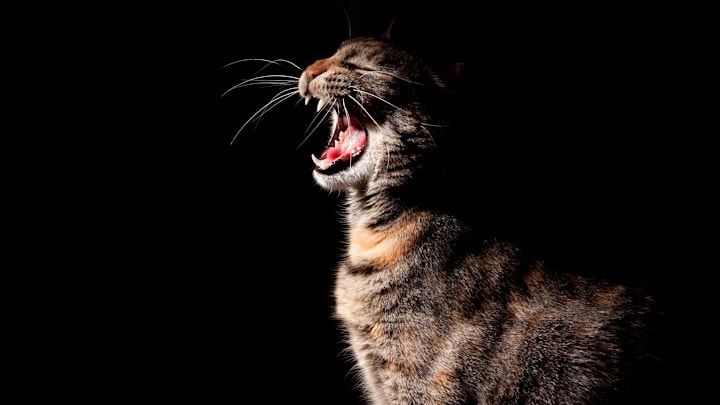No pet owner wants to be roused from a deep sleep by their animal’s loud cries. But waking up in the middle of the night to the sounds of a meowing cat is, unfortunately, a situation people may be all too familiar with.
Some people mistakenly think cats are nocturnal. The animals are actually crepuscular, meaning they tend to be more active during dawn and dusk. Hearing your cat start meowing for breakfast at sunrise shouldn’t come as a surprise. Midnight yowling, on the other hand, is a different story.
There are several techniques you can try to mitigate the issue. But before you can stop your cat from crying at night, you have to first figure out what’s driving the behavior.
- Your Cat Is Bored
- Your Cat Might Be Hungry
- Your Cat Has Underlying Health Issues
- Your Cat Is In Heat
- Your Cat Wants to Be Let Outside
- How to Stop Your Cat From Crying at Night
Your Cat Is Bored
According to Tori Schlosser, cat behavior specialist at Purrsuasion Cat Consulting and Training in Regina, Saskatchewan, Canada, boredom is likely the number one reason your kitty cries at night. “If they are not getting enough mental or physical enrichment [throughout the day], they will release that energy at night,” she tells Mental Floss.
How you react to their boredom-induced midnight cries can also exacerbate the behavior. Cats are clever creatures, and if they realize meowing at 2 a.m. will get them the attention they’re seeking, then they’ll continue to do it. “We reinforce [the behavior] unintentionally either by cooing ‘It’s OK. It’s fine. Come here,’ or by waking up and shutting the door or yelling at them or pushing them out of the room,” Schlosser says. “Either way, it’s still attention.”
Your Cat Might Be Hungry

Your cat could be crying at night because it’s hungry or thirsty. But that doesn’t mean you should get up and feed them—that’s just reinforcing the negative behavior. According to Schlosser, you’d essentially be teaching them that if they start meowing at 1 a.m., then someone will come and and give them food, leaving you stuck in an ongoing cycle of having to provide a late night snack just to get some peace and quiet.
Your Cat Has Underlying Health Issues
Vocalizing at night is a common symptom of age-related decline in cats, and could indicate feline dementia. Schlosser advises bringing your elderly pet to the vet for a check-up if you notice they’ve started crying at night; your veterinarian may suggest an enrichment plan, calming supplements, or, in certain situations, medication.
There are other health problems that may make a cat cry at night regardless of their age, such as hypertension, hyperthyroidism, or other pains. If you notice your cat has suddenly become more vocal—whether during the day or at night—it’s best to call your vet, as any changes in behavior can be a sign of an underlying health issue.
Your Cat Is In Heat
The caterwaul of a cat in heat could definitely wake up a household. It’s a very specific yowl you wouldn’t typically hear otherwise. An unfixed cat that’s in heat would cry both day and night, though the behavior would not last very long. In addition to stopping the racket, having your kitty sterilized will also help control the cat population.
Your Cat Wants to Be Let Outside

If you have an indoor-outdoor cat, it might meow to be let out. But given the dangers the outdoors pose to cats—and the dangers cats pose to birds and other small animals—it’s best to keep your kitty inside.
How to Stop Your Cat From Crying at Night
Once you rule out any age-related dementia or other health problems, you can take some steps to reduce or stop your cat’s nighttime cries. Simply shutting the door so they can’t get into your bedroom is likely not enough. All that meowing is their way of trying to communicate with you: “They are telling you ‘I need something, I have all this energy and need an outlet,’ ” Schlosser says.
Start by emphasizing mental and physical enrichment throughout the day: “The really important thing is that people focus on play.”
But don’t assume that just playing with them for 15 minutes before bed will do the trick. Cats should have stimulating activities like toys and puzzle feeders available to them throughout the day—whether you’re around or not. “If they’ve been sitting around for eight hours waiting for you to come home at the end of the day, they’ll need lots of rigorous play to burn off all that energy,” Schlosser says. Rather than trying to cram a whole day’s-worth of enrichment into one quick pre-bedtime play session, ensure they always access to toys and games that keep them stimulated.
Make sure they have a bowl full of food, fresh water, and a clean litter box. You could also try putting out a puzzle feeder for them before bedtime—that may help keep them entertained while also satisfying their cravings for some midnight munchies.
Read More Stories About Pet Behavior:
